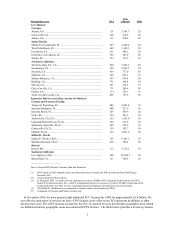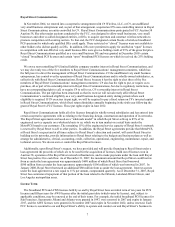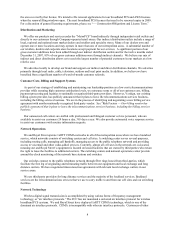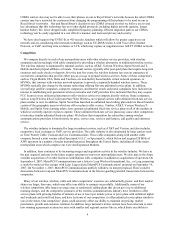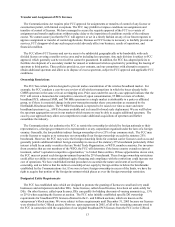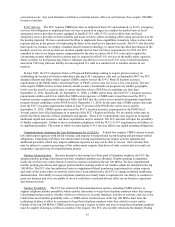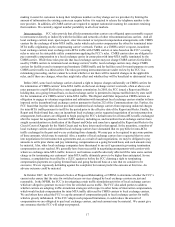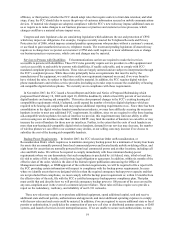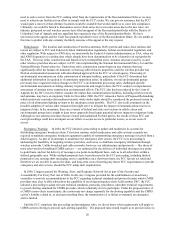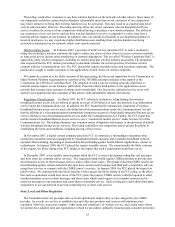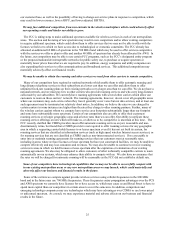Metro PCS 2007 Annual Report Download - page 26
Download and view the complete annual report
Please find page 26 of the 2007 Metro PCS annual report below. You can navigate through the pages in the report by either clicking on the pages listed below, or by using the keyword search tool below to find specific information within the annual report.
15
In connection with the changes to the DE rules, the FCC also adopted in April 2006 a Second Further Notice of
Proposed Rulemaking seeking comment on whether additional restrictions should be adopted in its DE program
relating to, among other things:
• relationships between designated entities and other communications enterprises based on class of services,
financial measures, or spectrum interests;
• the need to include other agreements within the definition of impermissible material relationships; and
• prohibiting entities or persons with net worth over a particular amount from being considered a DE.
There can be no assurance what additional changes, if any, to the DE program may be adopted as a result of this
further rulemaking. Based on the FCC’ s latest rulings, we do not expect any further changes in the DE rules to be
applied retroactively to Royal Street, but we cannot give any assurance that the FCC will not give any new rules
retroactive effect. If additional changes are made to the program that are applied to the current arrangements
between Royal Street, C9 Wireless and us, it could have a material adverse effect on our and Royal Street’ s
operations and financial performance.
General Regulatory Obligations
The Communications Act and the FCC’ s rules impose on wireless licensees a number of requirements, which
affect our cost of doing business and have a material effect on our business, operations, and financial results.
Our wireless broadband PCS and AWS services are classified at the federal level as commercial mobile radio
services, or CMRS. The FCC regulates providers of CMRS services as common carriers, which subjects us to many
requirements under the Communications Act and FCC rules and regulations. The FCC, however, has exempted
CMRS services from some typical common carrier regulations, such as tariff and interstate certification filings,
which allows us to respond more quickly to competition in the marketplace. The FCC also is required by federal law
to reduce unreasonable disparities in the regulatory treatment of similar mobile services, such as cellular, PCS and
Enhanced Specialized Mobile Radio, or ESMR, services, and federal law preempts state rate and entry regulation of
CMRS providers.
The FCC permits cellular, broadband PCS, AWS, and ESMR licensees to offer fixed services on a co-primary
basis along with mobile services. This facilitates the provision of wireless local loop service by CMRS licensees
using wireless links to provide local telephone service. The extent of lawful state regulation of such wireless local
loop service is undetermined. While we do not presently offer a fixed service, our network can accommodate such
an offering. We continue to evaluate our service offerings, and may offer a fixed service at some point in the future.
Relocation. Spectrum allocated for AWS currently is utilized by a variety of categories of commercial and
governmental users. To foster the orderly clearing of the spectrum, the FCC adopted a transition and cost sharing
plan pursuant to which incumbent non-governmental users could be reimbursed for relocating out of the band and
the costs of relocation would be shared by AWS licensees benefiting from the relocation. The FCC has established a
plan where the AWS licensee and the incumbent non-governmental user are to negotiate voluntarily for three years
and then, if no agreement has been reached, the incumbent licensee is subject to mandatory relocation procedures in
which the AWS licensee can relocate the incumbent non-governmental licensee at the AWS licensee’ s expense. The
spectrum allocated for AWS also currently is utilized by certain governmental users. The FCC rules provide that a
portion of the money raised in Auction 66 will be used to reimburse the relocation costs of governmental users from
the AWS band. However, not all governmental users are obligated to relocate, the timeframes for relocation vary,
and in some cases incumbent users are not obligated to relocate for some period of time. The time it will take to
clear the AWS spectrum in markets where we acquired licenses is uncertain and may delay our launch of service in
those markets.
Spectrum allocated for 700 MHz currently is occupied by existing analog television broadcast licensees. By
federal law, all existing analog television broadcast licenses are obligated to vacate the 700 MHz spectrum by the
digital television transition date, or February 17, 2009. Licensees granted 700 MHz licenses are not obligated to pay
for the relocation of existing analog television broadcast licensees. We are not expecting this fixed transition date to
change but cannot be certain that Congress will not alter this date if problems with the analog to digital TV


